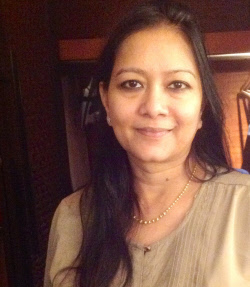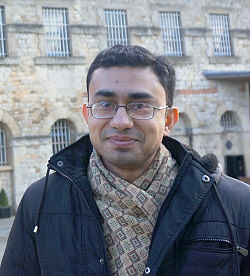An interview with Vinita Agrawal.
You have been writing for Spark for quite some time now. What do you feel about the journey so far?
Yes…I’ve had a long and fruitful journey with Spark spanning almost three years now. I’ve relished contributing my poems here every month. It’s also been very heartening to see the magazine grow in creative content, strength and stature. It just underlines the tremendous amount of work your team puts in to bring out a worthwhile journal every month. It’s no mean feat! I treasure my association with Spark.
Your poetic journey has been a long one. But when did you really start to think that poetry is what you wanted to do?
Well, I’ve been working freelance as a researcher and a writer for a long time now and writing poetry alongside, all my life. But for the past six years my drive to write poetry has emerged the strongest. I don’t get the same satisfaction from any other genre of writing like I get from poetry. It’s my weakness but I would like to make it my strength.
Do you believe that the emotion that poetry best portrays is pathos? Why or why not?
Classic poetry certainly leaned towards pathos. But that’s not true of contemporary poetry. I’ve read some stunning poetry that’s not about pathos. For example, Rilke wrote a brilliant poem on a Panther…an unconventional subject but under his masterful craft, it’s a breathtaking verse! This shows that it’s not only pathos which leaves an impact on the reader.
I’d like to share it here:
The Panther
His vision, from the constantly passing bars,
has grown so weary that it cannot hold
anything else. It seems to him there are
a thousand bars; and behind the bars, no world.
As he paces in cramped circles, over and over,
the movement of his powerful soft strides
is like a ritual dance around a center
in which a mighty will stands paralyzed.
Only at times, the curtain of the pupils
lifts, quietly–. An image enters in,
rushes down through the tensed, arrested muscles,
plunges into the heart and is gone.
– Rainer Maria Rilke – © all rights reserved
So, gone are the days when the typical poet was the quintessential heart-broken, mooning-for-his-lost-love wandering soul. It doesn’t hold true anymore. Poetry in the 20th century has acquired a spunk and spine of its own. It can effectively and delightfully convey subjects as diverse as a passport photograph:
A lot less flesh than flash, like the speed
at which the years have passed have left me
a little bit stunned, this latest passport photo
looks, all of a sudden, nothing like me.
It’s laughable! What am I doing in color?
My eyes no longer grey? And the hair? Where is it?
It’s as if every border I’ve passed through,
every damned port I’ve been stuck in
has taken an inordinate pleasure in stamping out
that young man, who looked like he could kill.
– Andrew Elliott, The Killers
Or a nurse or a care giver:
Carers are fifteen years younger
than you. They stop in for your boy,
they shower your mother not looking,
they unpeg and bring in the laundry.
Carers have learned the bad-smelling
jobs, and soak them as they chat.
Brown pivot stains shame a veteran – –
Old age is eventually a cat…
– The Care by Les Murray
Or perspectives of nature from a two-year-old’s eyes:
Two years old, he takes my hand,
leads me to the blackberry vine
growing on the fence in his backyard
They’re not ripe yet, he explains,
then points to a small hole
in the earth. The ants live there.
I need a digging stick, he announces,
holding up a fragile twig and shaking
his head. This one’s no good.
…..
Today, though, he’s the teacher
and I’m his eager pupil, standing
in light while blackberries ripen
and a woodlouse unrolls.
– Naturalists by Lucille Lang Day
as it can the angst of love and pining.
No pathos here anywhere in these verses but so enjoyable nonetheless!
Today poetry inspires, guides, motivates and puts into perspective, issues, which a few centuries ago could only have been done through prose. I am enlivened and heartened to see the percolation of poetry into everyday matters. Certainly a long journey from the expression of pathos!
You have written poems on a wide variety of themes and have had them published in many literary journals. But are there poems that you have written just for yourself – something that you have never/wouldn’t let the world read? When would you attempt/have you attempted something like that?
Now there’s a tricky question! All poets have a secret diary that’s meant for their eyes alone! At least I assume they do. But it’s got more to do with not being satisfied with the quality of the work rather than the subject of the work itself!
All my poetry is for public consumption, even though I’m always baring my soul in my poems. I only like to withhold those verses which might hurt someone’s sentiments. Sometimes I outpour more than what is justified in terms of creative liberties and those are the poems that I like to hold back.
Anything that has affected me deeply is a moment to write like that. However, after it’s done, I assess whether others would enjoy reading it as much as I needed to write it. Usually the answer is no!
You are a poet at heart, like your website says, Vinita. But do you write stories too? Have there been situations when you have preferred to express something through fiction rather than poetry? Can you give us some instances?
I’ve written very few short stories. Most of them are really, really short…almost like flash fiction. A few of them have been published. I guess I’m too lazy to engage in the intricacies of a long-drawn piece of prose. Hopefully, I’ll be able to change that in the next couple of years as there’s this desire to experiment with fiction kicking to life inside me in recent times.
There are things that can be expressed only through prose – for example, how would one express a sequence of actions leading to a particular situation through verse? The nuances of human emotions need adequate describing and are more suitably achieved by prose than by poetry. Prose has the advantage of holding the reader in a particular moment for a longer period of time whereas poetry by its very structure moves more quickly through its tale. Vikram Seth blended the forms of prose and poetry in his books The Suitable Boy and An Equal Music and he did so immaculately:
Perhaps this could have stayed unstated.
Had our words turned to other things
In the grey park, the rain abated,
Life would have quickened other strings.
….
Seth has this rare gift of seamlessly blending prose and poetry, but generally poetry and fiction have their own distinct qualities and perhaps I shall enjoy experimenting with short stories too.
We know you once did a photo essay for Spark. Are you actively into photography? What do you like to capture through your pictures?
I’m an amateur photographer. Nothing worth talking about. I enjoy photography as a hobby and truly believe that pictures speak louder than words. I like to photograph culture. And humour. Life is more vast than our imagination can ever be and when you come across such a moment in real time, it deserves to be captured through the lens!
Lastly, what’s your biggest goal as a writer?
I feel my journey has only begun. I would like to keep growing as a writer. Nothing pleases me more than to note that there are enhancements in the quality of my work, that I have learnt my skills better or that I am able to manoeuvre the craft of writing better than what I could yesterday. I’d like to touch people’s lives and hearts through my writing. That for me would be the greatest return for all that I write.
I would like to publish more books, that’s for sure, but most importantly, I would like to write till my last breath.
Vinita is a Mumbai-based, award winning writer and poet. Her poems have appeared in Asiancha, Constellations, The Fox Chase Review, Pea River Journal, Open Road Review, Everydaypoets.com, Mahmag World Literature, Miracle Magazine, Spark, The Brown Critique and Mandala among others. She was nominated for the Best of the Net Awards 2011 and awarded first prize in the Wordweavers Contest 2014, commendation prize in the All India Poetry Competition 2014 and the 2014 Hour of Writes Contest twice. Her debut collection – Words Not Spoken – published by Brown Critique/Sampark was released in November 2013. She was featured in the ten questions interview series on Fox Chase Review. She has a Masters in Political Science with a gold medal and is a full-time writer, working freelance.
Questions by Anupama Krishnakumar






